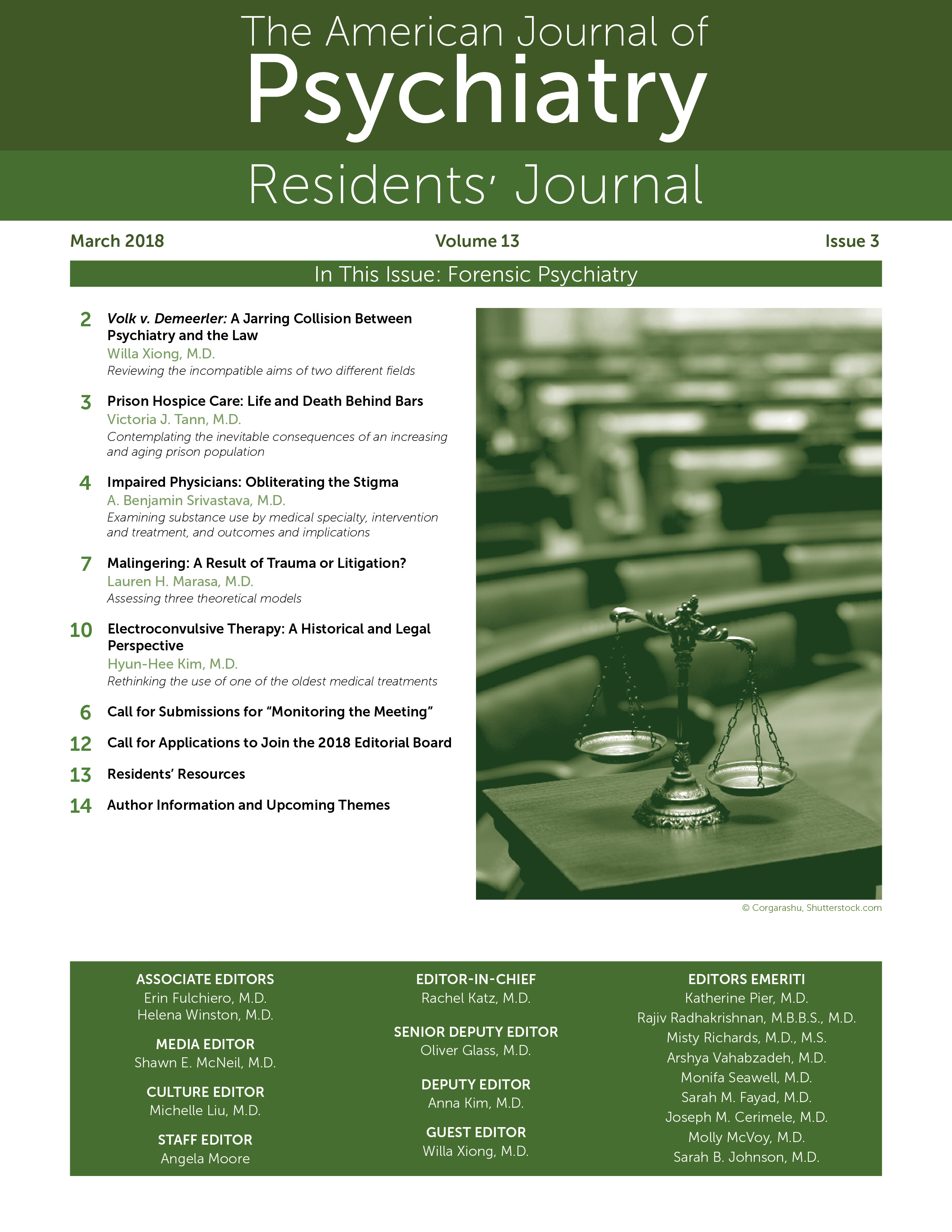Prison Hospice Care: Life and Death Behind Bars
When you have to change a man's diapers and it goes against everything that you've ever really stood for, what you realize is that it's this whole different side of you that says this is the humane thing to do, this is the right thing to do …. It was real humbling. (1)
Hospice care is a unique field that enables psychiatrists to use their skillset to improve the quality of life and experience of death for terminally ill patients and their families. Prison hospice is an expanding specialty that should be considered by physicians who are interested in the legal system, hospice care, and care for vulnerable populations.
An increase in both the U.S. prison population and average inmate age has burdened the correctional system with caring for chronically and terminally ill incarcerated persons. One response to this problem was the Sentencing Reform Act of 1984, which provided the option of compassionate release for dying inmates. However, this policy has been largely ineffective, with release of few incarcerated persons and with some inmates dying in prison during the long petition process (2). Prison hospice programs offer an alternative to compassionate release and provide both inmate volunteers and psychiatrists with the unique opportunity to care for individuals in the criminal justice system.
Psychiatrists involved in prison hospice programs provide expertise in establishing an individual's mental capacity and in identifying and treating common end-of-life problems, such as anxiety, depression, and delirium. They also bring with them skills in psychotherapy and familiarity with grief (3). While directly addressing issues surrounding death, they are further equipped to ensure that pre-existing mental health diagnoses are appropriately addressed. The literature recognizes that large numbers of incarcerated persons have a psychiatric disorder that is undertreated, untreated, or undiagnosed (2, 4).
One challenge in prison hospice programs is pain management. Diversion of narcotic medications in prison settings is a recognized concern. Apprehensions about misuse or abuse may present barriers to care, especially considering the highly publicized opioid epidemic. Despite these concerns, the majority of prison hospice respondents to a 2011 survey reported use of long-acting opioid medications to treat pain. Less than one-half of respondents endorsed the use of short-acting medications and patient-controlled analgesia (5). Many psychiatrists have fellowship training in addiction medicine and can offer pharmacologic expertise pertaining to the use, prescription, and potential drug interactions of several medications used to treat pain and anxiety in terminally ill patients.
Prison hospice programs, like other hospice care programs, are multidisciplinary. Psychiatrists participating in prison hospice programs work side by side with other health professionals and also may have the unique opportunity to work with inmate volunteers. Many prison hospice programs enlist inmate volunteers, who are required to meet strict selection criteria and undergo several hours of prerequisite training (1, 5). Although some might question the use of incarcerated persons to care for their ailing peers, the majority of prison hospice programs report never experiencing an incident in which a volunteer took advantage of a patient (5). Participation in prison hospice has the potential to significantly benefit the lives of volunteers, as they may see their work as a way to bring value to their own lives or as contrition for their past criminal offenses. Volunteers recognize the emotional strain of coping with the loss of their fellow inmates but endorse use of positive coping mechanisms in dealing with grief (1, 5).
1. : Caring to learn and learning to care: inmate hospice volunteers and the delivery of prison end-of-life care. J Correct Health Care 2017; 23(1):43–55 Crossref, Google Scholar
2. : Psychiatry and the dying prisoner. Int Rev Psychiatry 2017; 29(1):45–50 Crossref, Google Scholar
3. : The opportunity for psychiatry in palliative care. Can J Psychiatry 2008; 53(11):713–724 Crossref, Google Scholar
4. : Mental disorders among criminal offenders: a review of the literature. J Correct Health Care 2017; 23(3):336–346 Crossref, Google Scholar
5. : Characteristics of prison hospice programs in the United States. Am J Hosp Palliat Care 2011; 28(4):245–252 Crossref, Google Scholar



